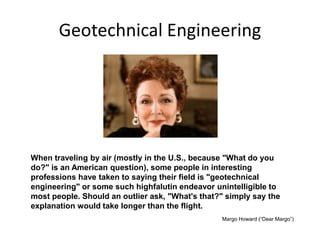Our Geotheta Diaries
Table of ContentsThe Single Strategy To Use For GeothetaOur Geotheta DiariesWhat Does Geotheta Mean?The Geotheta DiariesSome Ideas on Geotheta You Need To Know

They perform site investigations, accumulate examples, perform lab tests, and evaluate data to review the viability of the ground for construction tasks - Consulting Engineers. Based on their findings, geotechnical designers provide suggestions for foundation style, incline security, preserving frameworks, and mitigation of geotechnical dangers. They collaborate with various other professionals, such as designers, architectural designers, and construction teams, to make sure that geotechnical factors to consider are integrated into the total project design and implementation
By evaluating the behavior and residential or commercial properties of dirt and rock, they can recognize possible geotechnical dangers such as landslides, soil settlement, or incline instability. Their proficiency aids prevent failings or crashes that might endanger lives and building. Right here are some comprehensive responsibilities and duties of a geotechnical designer: Site Examination: Geotechnical designers conduct site examinations to gather data on subsurface problems.
They interpret the data to comprehend the properties and behavior of the soil and rock, including their strength, leaks in the structure, compaction attributes, and groundwater problems. Geotechnical Analysis and Design: Geotechnical engineers evaluate the data accumulated throughout site investigations to evaluate the security and viability of the site for construction projects. They do geotechnical calculations and modeling to evaluate aspects such as bearing capacity, negotiation, slope security, side earth pressures, and groundwater circulation.
The Buzz on Geotheta
Foundation Design: Geotechnical designers play an essential function in developing structures that can safely sustain the intended framework. They evaluate the dirt conditions and lots requirements to establish the proper structure type, such as shallow structures (e.g., footings), deep structures (e.g (https://geotheta.edublogs.org/2024/08/02/unlocking-the-world-of-geotechnical-engineers-with-geotheta/)., piles), or specialized techniques like soil renovation. They consider variables such as settlement restrictions, birthing ability, and soil-structure interaction to establish ideal foundation layouts
They assess building and construction strategies, screen website activities, and perform area assessments to confirm that the style suggestions are complied with. If unexpected geotechnical issues develop, they examine the circumstance and offer suggestions for removal or adjustments to the layout. Danger Analysis and Reduction: Geotechnical engineers assess geotechnical threats and threats related to the job site, such as landslides, liquefaction, or dirt erosion.

Cooperation and Interaction: Geotechnical engineers function very closely with various other specialists included in a job, such as architects, architectural designers, and building groups. Effective interaction and collaboration are vital to integrate geotechnical factors to consider right into the general project style and building process. Geotechnical designers offer technological competence, answer inquiries, and make sure that geotechnical demands are fulfilled.
Some Known Details About Geotheta
Below are some sorts of geotechnical designers: Structure Designer: Structure designers specialize in creating and examining structures for frameworks. They analyze the dirt problems, lots needs, and website characteristics to identify the most suitable foundation type and design, such as shallow foundations, deep foundations, or specialized techniques like heap structures.
They assess the aspects influencing incline security, such as soil buildings, groundwater problems, and incline geometry, and develop methods to avoid incline failings and alleviate dangers. Earthquake Engineer: Quake designers specialize in evaluating and designing frameworks to hold up against seismic pressures. They examine the seismic risk of a site, evaluate dirt liquefaction capacity, and develop seismic layout standards to make sure the security and resilience of frameworks during earthquakes.
They execute area testing, collect examples, and evaluate the collected information to characterize the dirt properties, geologic developments, and groundwater conditions at a site. Geotechnical Instrumentation Designer: Geotechnical instrumentation engineers focus on surveillance and determining the behavior of dirt, rock, and structures. They mount and preserve instrumentation systems that check aspects such as soil settlement, groundwater degrees, slope movements, and architectural displacements to analyze performance and give early cautions of prospective concerns.
4 Simple Techniques For Geotheta
They perform tests such as triaxial tests, combination tests, direct shear tests, and leaks in the structure examinations to gather data for geotechnical evaluation and layout. Geosynthetics Engineer: Geosynthetics engineers specialize in the style and application of geosynthetic products, such as geotextiles, geogrids, and geomembranes. They make use of these materials to improve soil stability, enhance slopes, offer drain options, and control disintegration.
They often tend to be investigative individuals, which implies they're intellectual, introspective, and investigative. They wonder, systematic, logical, logical, and sensible. Several of them are likewise social, implying they're kind, charitable, cooperative, person, caring, valuable, empathetic, sensible, and pleasant. Does this sound like you? Take our free occupation test to learn if geotechnical designer is just one of your leading job suits.
In important link the office environment, geotechnical designers use specialized software program tools to perform calculations, create styles, and evaluate data. They prepare reports, review project specifications, connect with clients and team participants, and coordinate project activities. The office setup supplies a helpful setting for research study, analysis, and cooperation with various other experts involved in the task.
Excitement About Geotheta
They regularly visit task websites to perform website examinations, examine geotechnical conditions, and gather information for evaluation. These sees include taking a trip to different places, occasionally in remote or difficult surfaces. Geotechnical designers may execute soil tasting, conduct tests, and display building and construction activities to make certain that the geotechnical aspects of the project are being applied correctly.
Geotechnical designers likewise function in specialized geotechnical labs. Geotechnical lab designers function thoroughly in these atmospheres, managing screening devices, running tools, and tape-recording data.